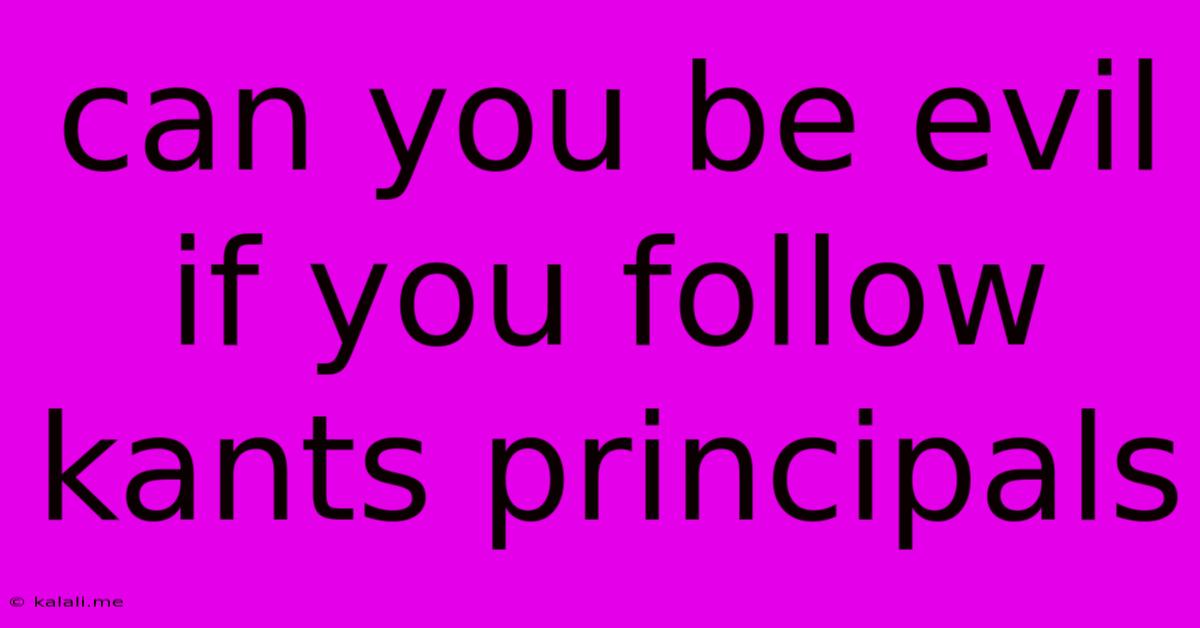Can You Be Evil If You Follow Kants Principals
Kalali
Jun 04, 2025 · 3 min read

Table of Contents
Can You Be Evil if You Follow Kant's Principles? A Deep Dive into Kantian Ethics
This article explores the complex question of whether it's possible to act evilly while adhering to Immanuel Kant's ethical framework. Kant's deontological approach, emphasizing duty and universal moral laws, might seem to preclude evil acts. However, a closer examination reveals potential nuances and challenges. We'll delve into the complexities of Kantian ethics and explore scenarios where following Kantian principles could, paradoxically, lead to outcomes deemed evil by many.
Understanding Kant's Categorical Imperative
The cornerstone of Kant's moral philosophy is the Categorical Imperative, a supreme principle of morality. It dictates that we should only act according to maxims (principles) that we could rationally will to become universal laws. This means our actions must be consistent and applicable to everyone. Kant also introduces the principle of treating humanity as an end in itself, never merely as a means. This emphasizes respect for individual autonomy and dignity.
The Potential for "Evil" within Kantian Ethics
While Kant's system aims to prevent evil, its rigid structure presents potential pitfalls. Here are some scenarios that challenge the notion of absolute moral goodness within a purely Kantian framework:
-
Conflicting Duties: Kant's system struggles when faced with conflicting duties. Imagine a situation where lying is the only way to save an innocent life. Following the categorical imperative (never lie) would directly contradict the imperative to protect human life. This creates a moral dilemma, suggesting the limitations of a purely rule-based ethical system. Resolving such conflicts requires careful consideration and potentially subjective interpretations.
-
Rigidity and Lack of Context: Kant's emphasis on universal rules often disregards the specifics of individual situations. A strict adherence to his principles, ignoring context, could lead to outcomes considered cruel or unjust. For instance, rigidly adhering to a rule against stealing might leave someone starving without means of obtaining food, an outcome many would consider morally reprehensible.
-
The Problem of Intent vs. Outcome: Kant's focus is primarily on the intention behind an action, rather than its consequences. A well-intentioned action, performed with the belief that it aligns with the categorical imperative, could still have devastating unintended consequences. This raises the question: if the outcome is objectively evil, does the purity of the intention negate the moral harm?
-
Defining "Evil": The very definition of "evil" is subjective and culturally influenced. What one society deems evil, another might consider acceptable. A Kantian approach, with its focus on universal principles, might clash with culturally specific notions of morality.
Reconciling Kantian Ethics and Moral Outcomes
It's crucial to remember that Kant’s system is not intended as a simple checklist for moral decision-making. It demands careful reasoning, critical self-reflection, and a genuine commitment to acting morally. While adhering to the categorical imperative can minimize the likelihood of acting evilly, the complexities of human interaction and unforeseen consequences mean that even the most well-intentioned Kantian agent may face challenging situations with potentially negative outcomes.
Instead of asking whether one can be evil while following Kant's principles, it's more productive to consider whether following those principles minimizes the likelihood of causing harm. The emphasis on rationality, respect for persons, and consistent moral action are valuable guides, but they don't provide a foolproof method to prevent all negative consequences.
Conclusion
The question of whether evil is possible within a Kantian framework is complex and ultimately depends on how we define "evil" and interpret the nuances of the categorical imperative. While Kant's ethics strive for a universally applicable moral system, the rigidity of his rules can lead to difficult moral dilemmas. The focus should be on striving for moral excellence guided by rational principles, acknowledging the inherent limitations of any ethical system in the face of unpredictable human experience and subjective interpretations of morality.
Latest Posts
Latest Posts
-
What Blood Type Does Jesus Have
Jun 06, 2025
-
How To Upload Xbox 360 Games To Hard Drive
Jun 06, 2025
-
Is It Normal For Toddlers To Play By Themselves
Jun 06, 2025
-
How Many Spells Can A Wizard Prepare
Jun 06, 2025
-
How Do You Delete A Message On Messenger
Jun 06, 2025
Related Post
Thank you for visiting our website which covers about Can You Be Evil If You Follow Kants Principals . We hope the information provided has been useful to you. Feel free to contact us if you have any questions or need further assistance. See you next time and don't miss to bookmark.